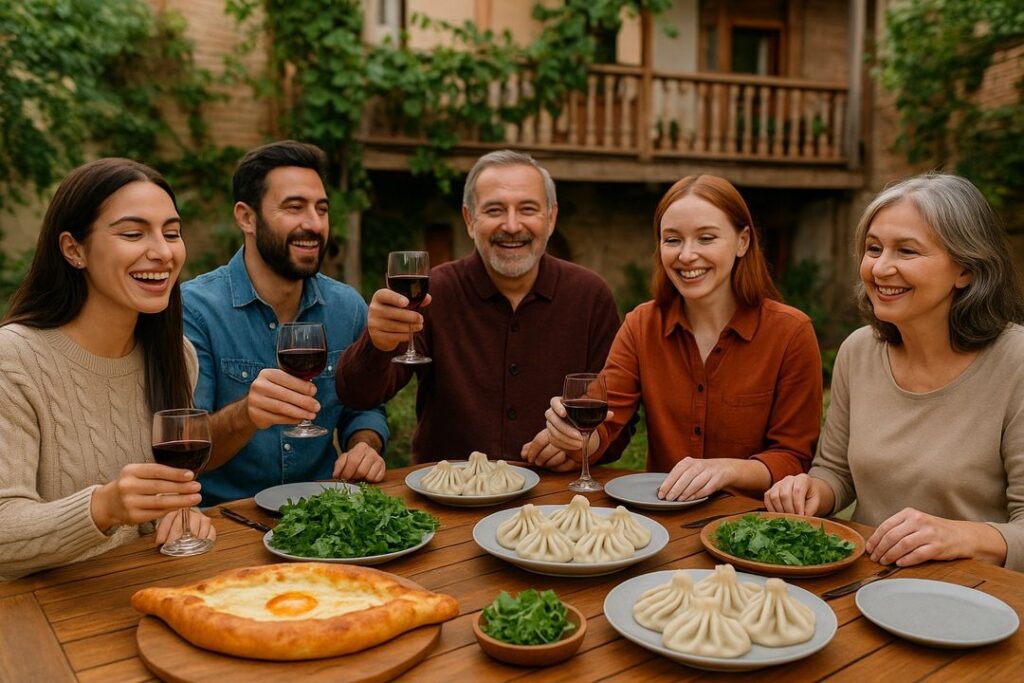A heartfelt guide to culture, etiquette, and the warmth of being a guest
The first thing you notice isn’t the streets or the mountains
Georgia doesn’t greet you with monuments or billboards. It welcomes you with a glance, a gesture, a chair pulled out at a table you didn’t expect to join.
Before you even unpack your suitcase, someone may have already offered you coffee, pointed you toward their favorite bakery, or invited you to try homemade wine in a backyard garden. It doesn’t feel like a performance. It feels… natural. Like you’ve returned to a place you didn’t realize you missed.
But to truly understand Georgia, you’ll need to step beyond city tours and busy streets. The real country hides in vineyard villages in Kakheti, in the wind-whipped silence of Svaneti’s mountains, in small homes with wide porches and even wider hearts. That’s why it’s worth saying right at the start: renting a car in Tbilisi gives you the kind of freedom this country was made for. The roads may be winding, but the rewards are endless — a stranger who invites you in, a view you weren’t expecting, a conversation that starts without words.
In Georgia, being a guest is almost sacred
There’s a saying in Georgia: “A guest is from God.” It’s not just a nice phrase — it’s how people live. You’ll feel it in the way someone offers you the best chair, piles food on your plate even after you’ve said you’re full, or insists you stay the night when you only meant to stay for tea.
You’re not just welcomed. You’re honored.
It doesn’t matter who you are or where you come from. In that moment — in their home, at their table — you’re someone worth celebrating. And that celebration isn’t about extravagance. Sometimes the food is simple, the house small. But the generosity? That’s always grand.
Getting invited in: say yes, and don’t overthink it
If someone invites you into their home — and trust me, it happens more often than you’d think — don’t brush it off out of politeness or shyness. In Georgia, such an invitation is more than kindness. It’s connection. It’s trust.
You don’t need to bring gifts, but if you have something sweet or a bottle of wine, it’ll be warmly received. And once you’re inside, don’t expect to leave quickly. You’ll be seated, fed, offered drinks (yes, plural), and likely find yourself deep in conversation with people who spoke no English ten minutes ago — and yet somehow, you’ll understand everything.
Because here, hospitality isn’t a duty. It’s joy.
The supra: more than a meal
If you’re lucky — and most travelers are — you’ll end up at a supra, a traditional Georgian feast. It can be small or huge, casual or formal, but one thing is constant: it’s a celebration of life, people, and connection.
At the center of the table sits the tamada, the toastmaster. He doesn’t just raise a glass. He tells stories, weaves meaning into moments, dedicates toasts to peace, to family, to the road ahead. You’ll be invited to listen. Maybe even to speak. But don’t interrupt — that’s sacred ground.
And if you don’t drink alcohol? No problem. Simply raise your glass with respect, even if it’s just water. No one will pressure you. Because here, wine isn’t about getting drunk. It’s about belonging.
And yet… if you do drink, try the homemade wine. It might be cloudy, strong, even surprising. But it’s alive. Made with pride, served with warmth. Then there’s chacha — the local grape spirit that feels more like fire in your soul than in your throat. Drink it slowly, with intention. Chacha isn’t a shot — it’s a ritual.
Georgian food is like the people who make it
It’s generous, bold, earthy, a little wild, and deeply comforting.
You’ll be handed khinkali and shown — with both joy and strict rules — how to eat them without spilling the broth. You’ll break into khachapuri, feel cheese stretch between your fingers, and wonder how something so rich can taste so fresh. You’ll taste herbs you don’t recognize, dips that seem ancient, and dishes with names you’ll try to remember but probably forget. Doesn’t matter. What you’ll remember is how it made you feel.
Eating here is never just about filling your stomach. It’s a shared moment. An exchange. A way of saying: “You are welcome, and you matter.”
And if you praise the food — which you probably will — you’re not just complimenting the cook. You’re honoring their story.
What Georgians love — and what they don’t
Georgians love honesty. Curiosity. The kind of interest that isn’t rehearsed or Googled. If you say even one word in Georgian — “madloba” (thank you) — you’ll likely see someone light up. It’s not about fluency. It’s about trying. It’s about respect.
They love when you sit with them without checking your watch. When you ask about their vineyard, their children, their home. When you drink what they poured, eat what they made, and take your time doing it.
What they don’t love? Arrogance. Superiority. The tone of a visitor who’s “seen better.” They don’t enjoy debates about politics or history from strangers who just arrived. And they especially don’t appreciate someone refusing kindness — not out of humility, but out of coldness.
They won’t say it. They’ll still treat you well. But the magic — it’ll vanish.
On the streets and in small moments
Unlike in some countries, Georgians won’t always smile at strangers in the street. That doesn’t mean they’re unfriendly — it just means their kindness comes slower, deeper. But when you need help, they will stop what they’re doing, walk you to the right bus, sometimes even drive you there themselves.
One afternoon in Telavi, I asked a woman how to reach a winery. She didn’t explain — she walked me there. We didn’t speak the same language. We walked mostly in silence. But before we parted ways, she looked at me, smiled just a little, and said something I couldn’t translate — and yet understood perfectly.
That’s Georgia.
Not loud. Not showy. But fiercely human. And unforgettable.





